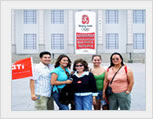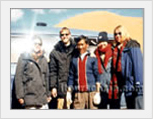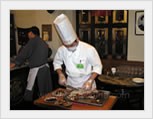
Chinese Kunqu Opera
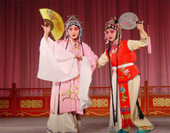 The original version of Kunqu opera, It was written by Hong Sheng (1645 - 1704) consisted of 50 episodes. Unfortunately many performance have been lost, and only a few are performed right now. Suzhou Opera Theatre performs a 27 episode show over 3 nights, rearranged by Kungqu Opera expert Gu Duhuang. Kunqu Opera, also called Kunshanqiang, is said to be the mother of all Chinese operas. Its beginnings can be traced to the late Yuan Dynasty, some 600 years ago, in the lower Yangtze Valley. Among the earliest genres of drama, the traditional performing art was named for its birthplace, Kunshan, near the city of Suzhou in
The original version of Kunqu opera, It was written by Hong Sheng (1645 - 1704) consisted of 50 episodes. Unfortunately many performance have been lost, and only a few are performed right now. Suzhou Opera Theatre performs a 27 episode show over 3 nights, rearranged by Kungqu Opera expert Gu Duhuang. Kunqu Opera, also called Kunshanqiang, is said to be the mother of all Chinese operas. Its beginnings can be traced to the late Yuan Dynasty, some 600 years ago, in the lower Yangtze Valley. Among the earliest genres of drama, the traditional performing art was named for its birthplace, Kunshan, near the city of Suzhou in
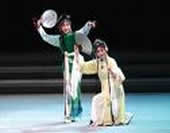 today's Jiangsu Province of East China. The development of Kunqu Opera music went through several stages. In the early days, the songs were composed of long and short lines. The singer sang solo, and the orchestra came in at the end of each line. In the course, only percussion instruments were used. In the Ming Dynasty (1368-1644), Kunqu Opera became mild, smooth, and graceful. The performers attached great importance to clear recitation, correct singing, and pure tunes. Moreover, three types of musical instruments (stringed instruments, bamboo flutes, and drums and clappers) formed the accompaniment. In addition, the jing and chou roles were no longer those exclusively portraying foolish, awkward, or stingy people. Kunqu Opera is
today's Jiangsu Province of East China. The development of Kunqu Opera music went through several stages. In the early days, the songs were composed of long and short lines. The singer sang solo, and the orchestra came in at the end of each line. In the course, only percussion instruments were used. In the Ming Dynasty (1368-1644), Kunqu Opera became mild, smooth, and graceful. The performers attached great importance to clear recitation, correct singing, and pure tunes. Moreover, three types of musical instruments (stringed instruments, bamboo flutes, and drums and clappers) formed the accompaniment. In addition, the jing and chou roles were no longer those exclusively portraying foolish, awkward, or stingy people. Kunqu Opera is
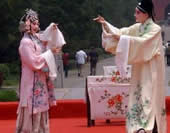 acknowledged as an elegant opera in terms of music, recitation, and the performers' movement. It is foremost acclaimed as "watermill song" because of its soft arias and the graceful movement of its performers. Carrying forward the tradition of ancient poetry and common speech, the art is also of very high literary value. Kunqu Opera has its own distinctive tunes. The orchestra consists of traditional instruments including the dizi, a horizontal bamboo flute which plays the lead part; the xiao, a vertical bamboo flute; the sheng, a mouth organ; and the pipa, a plucked string instrument with a fretted finger board. Many Chinese local operas are greatly influenced by its tunes and acting style.
acknowledged as an elegant opera in terms of music, recitation, and the performers' movement. It is foremost acclaimed as "watermill song" because of its soft arias and the graceful movement of its performers. Carrying forward the tradition of ancient poetry and common speech, the art is also of very high literary value. Kunqu Opera has its own distinctive tunes. The orchestra consists of traditional instruments including the dizi, a horizontal bamboo flute which plays the lead part; the xiao, a vertical bamboo flute; the sheng, a mouth organ; and the pipa, a plucked string instrument with a fretted finger board. Many Chinese local operas are greatly influenced by its tunes and acting style.
Your Question & Quick Answer*We welcome and appreciate your questions & reviews
Booking Procedures | Terms & Conditions | Payment Methods | Links | Site Map | About Us | Contact Us | Travel Agent
Copyright 2008, All rights reserved.. itourbeijing.com ,china culture, china introduction
TEL: 86-10-85711972 (Universal) 1-888-288-9328 (North America) E-mail: contact@itourbeijng.com
Home | China Tours | Beijing Tours | Tibet Tours | China Travel | Beijing Travel | Shanghai Travel
